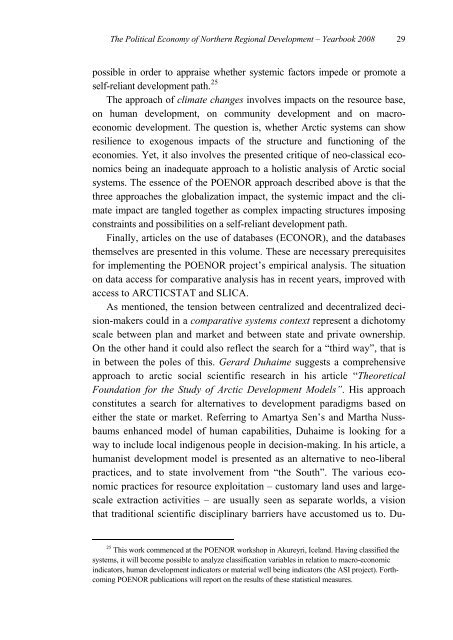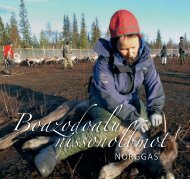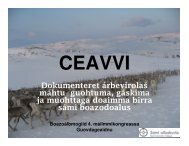- Page 3 and 4: The Political Economy of Northern R
- Page 5 and 6: Content 1. Introduction to the Proj
- Page 7 and 8: 1. Introduction to the Project and
- Page 9 and 10: The Political Economy of Northern R
- Page 11 and 12: The Political Economy of Northern R
- Page 13 and 14: The Political Economy of Northern R
- Page 15 and 16: The Political Economy of Northern R
- Page 17 and 18: The Political Economy of Northern R
- Page 19 and 20: The Political Economy of Northern R
- Page 21 and 22: The Political Economy of Northern R
- Page 23 and 24: The Political Economy of Northern R
- Page 25 and 26: The Political Economy of Northern R
- Page 27: The Political Economy of Northern R
- Page 31 and 32: The Political Economy of Northern R
- Page 33 and 34: The Political Economy of Northern R
- Page 35 and 36: The Political Economy of Northern R
- Page 37 and 38: The Political Economy of Northern R
- Page 39 and 40: The Political Economy of Northern R
- Page 41 and 42: 2. Theoretical foundation for the s
- Page 43 and 44: The Political Economy of Northern R
- Page 45 and 46: The Political Economy of Northern R
- Page 47 and 48: The Political Economy of Northern R
- Page 49 and 50: The Political Economy of Northern R
- Page 51 and 52: The Political Economy of Northern R
- Page 53 and 54: The Political Economy of Northern R
- Page 55 and 56: 3. Sustainability from a local poin
- Page 57 and 58: The Political Economy of Northern R
- Page 59 and 60: The Political Economy of Northern R
- Page 61 and 62: The Political Economy of Northern R
- Page 63 and 64: The Political Economy of Northern R
- Page 65 and 66: The Political Economy of Northern R
- Page 67 and 68: The Political Economy of Northern R
- Page 69 and 70: The Political Economy of Northern R
- Page 71 and 72: The Political Economy of Northern R
- Page 73 and 74: 4. The social economy and economic
- Page 75 and 76: The Political Economy of Northern R
- Page 77 and 78: The Political Economy of Northern R
- Page 79 and 80:
The Political Economy of Northern R
- Page 81 and 82:
The Political Economy of Northern R
- Page 83 and 84:
The Political Economy of Northern R
- Page 85 and 86:
The Political Economy of Northern R
- Page 87 and 88:
The Political Economy of Northern R
- Page 89 and 90:
The Political Economy of Northern R
- Page 91 and 92:
The Political Economy of Northern R
- Page 93 and 94:
The Political Economy of Northern R
- Page 95 and 96:
The Political Economy of Northern R
- Page 97 and 98:
The Political Economy of Northern R
- Page 99:
The Political Economy of Northern R
- Page 102 and 103:
102 The Political Economy of Northe
- Page 104 and 105:
104 The Political Economy of Northe
- Page 106 and 107:
106 The Political Economy of Northe
- Page 108 and 109:
108 The Political Economy of Northe
- Page 110 and 111:
110 The Political Economy of Northe
- Page 112 and 113:
112 The Political Economy of Northe
- Page 114 and 115:
114 The Political Economy of Northe
- Page 116 and 117:
116 The Political Economy of Northe
- Page 118 and 119:
118 The Political Economy of Northe
- Page 120 and 121:
120 The Political Economy of Northe
- Page 122 and 123:
122 The Political Economy of Northe
- Page 124 and 125:
124 The Political Economy of Northe
- Page 126 and 127:
126 The Political Economy of Northe
- Page 128 and 129:
128 The Political Economy of Northe
- Page 130 and 131:
130 The Political Economy of Northe
- Page 132 and 133:
132 The Political Economy of Northe
- Page 134 and 135:
134 The Political Economy of Northe
- Page 136 and 137:
136 The Political Economy of Northe
- Page 138 and 139:
138 The Political Economy of Northe
- Page 140 and 141:
140 The Political Economy of Northe
- Page 142 and 143:
142 The Political Economy of Northe
- Page 144 and 145:
144 The Political Economy of Northe
- Page 146 and 147:
146 The Political Economy of Northe
- Page 148 and 149:
148 The Political Economy of Northe
- Page 150 and 151:
150 The Political Economy of Northe
- Page 152 and 153:
152 The Political Economy of Northe
- Page 154 and 155:
154 The Political Economy of Northe
- Page 156 and 157:
156 The Political Economy of Northe
- Page 158 and 159:
158 The Political Economy of Northe
- Page 160 and 161:
160 The Political Economy of Northe
- Page 163 and 164:
8. Local implications of housing re
- Page 165 and 166:
The Political Economy of Northern R
- Page 167 and 168:
The Political Economy of Northern R
- Page 169 and 170:
The Political Economy of Northern R
- Page 171 and 172:
The Political Economy of Northern R
- Page 173 and 174:
The Political Economy of Northern R
- Page 175 and 176:
9. Climate change and economic syst
- Page 177 and 178:
The Political Economy of Northern R
- Page 179 and 180:
The Political Economy of Northern R
- Page 181 and 182:
The Political Economy of Northern R
- Page 183 and 184:
The Political Economy of Northern R
- Page 185 and 186:
The Political Economy of Northern R
- Page 187:
The Political Economy of Northern R
- Page 190 and 191:
190 The Political Economy of Northe
- Page 192 and 193:
192 The Political Economy of Northe
- Page 194 and 195:
194 The Political Economy of Northe
- Page 196 and 197:
196 The Political Economy of Northe
- Page 198 and 199:
198 The Political Economy of Northe
- Page 200 and 201:
200 The Political Economy of Northe
- Page 202 and 203:
202 The Political Economy of Northe
- Page 204 and 205:
204 The Political Economy of Northe
- Page 206 and 207:
206 The Political Economy of Northe
- Page 208 and 209:
208 The Political Economy of Northe
- Page 210 and 211:
210 The Political Economy of Northe
- Page 212 and 213:
212 The Political Economy of Northe
- Page 214 and 215:
214 The Political Economy of Northe
- Page 216 and 217:
216 The Political Economy of Northe
- Page 218 and 219:
218 The Political Economy of Northe
- Page 220 and 221:
220 The Political Economy of Northe
- Page 222 and 223:
222 The Political Economy of Northe
- Page 224 and 225:
224 The Political Economy of Northe
- Page 226 and 227:
226 The Political Economy of Northe
- Page 228 and 229:
228 The Political Economy of Northe
- Page 230 and 231:
230 The Political Economy of Northe
- Page 232 and 233:
232 The Political Economy of Northe
- Page 234 and 235:
234 The Political Economy of Northe
- Page 236 and 237:
236 The Political Economy of Northe
- Page 238 and 239:
238 The Political Economy of Northe
- Page 240 and 241:
240 The Political Economy of Northe
- Page 242 and 243:
242 The Political Economy of Northe
- Page 244 and 245:
244 The Political Economy of Northe
- Page 246 and 247:
246 The Political Economy of Northe
- Page 248 and 249:
248 The Political Economy of Northe
- Page 250 and 251:
250 The Political Economy of Northe
- Page 252 and 253:
252 The Political Economy of Northe
- Page 254 and 255:
254 The Political Economy of Northe
- Page 256 and 257:
256 The Political Economy of Northe
- Page 258 and 259:
258 The Political Economy of Northe
- Page 260 and 261:
260 The Political Economy of Northe
- Page 262 and 263:
262 The Political Economy of Northe
- Page 264 and 265:
264 The Political Economy of Northe
- Page 266 and 267:
266 The Political Economy of Northe
- Page 268 and 269:
268 The Political Economy of Northe
- Page 270 and 271:
270 The Political Economy of Northe
- Page 272 and 273:
272 The Political Economy of Northe
- Page 274 and 275:
274 The Political Economy of Northe
- Page 276 and 277:
276 The Political Economy of Northe
- Page 278 and 279:
278 The Political Economy of Northe
- Page 280 and 281:
280 The Political Economy of Northe
- Page 282 and 283:
282 The Political Economy of Northe
- Page 284 and 285:
284 The Political Economy of Northe
- Page 287 and 288:
15. Some data sources on people, pe
- Page 289 and 290:
The Political Economy of Northern R
- Page 291 and 292:
The Political Economy of Northern R
- Page 293 and 294:
The Political Economy of Northern R
- Page 295 and 296:
The Political Economy of Northern R
- Page 297 and 298:
The Political Economy of Northern R
- Page 299 and 300:
The Political Economy of Northern R
- Page 301 and 302:
The Political Economy of Northern R
- Page 303 and 304:
The Political Economy of Northern R
- Page 305 and 306:
The Political Economy of Northern R
- Page 307 and 308:
The Political Economy of Northern R
- Page 309 and 310:
The Political Economy of Northern R
- Page 311 and 312:
The Political Economy of Northern R
- Page 313 and 314:
The Political Economy of Northern R
- Page 315 and 316:
The Political Economy of Northern R
- Page 317 and 318:
The Political Economy of Northern R
- Page 319 and 320:
The Political Economy of Northern R
- Page 321 and 322:
16. Comparative-historical analysis
- Page 323 and 324:
The Political Economy of Northern R
- Page 325 and 326:
The Political Economy of Northern R
- Page 327 and 328:
The Political Economy of Northern R
- Page 329 and 330:
The Political Economy of Northern R
- Page 331 and 332:
The Political Economy of Northern R
- Page 333 and 334:
The Political Economy of Northern R
- Page 335 and 336:
The Political Economy of Northern R
- Page 337 and 338:
The Political Economy of Northern R
- Page 339 and 340:
Resume Artiklerne. Artiklerne i POE
- Page 341 and 342:
The Political Economy of Northern R
- Page 343 and 344:
The Political Economy of Northern R
- Page 345 and 346:
The Political Economy of Northern R
- Page 347 and 348:
The Political Economy of Northern R
- Page 349 and 350:
The Political Economy of Northern R
- Page 351:
The Political Economy of Northern R





